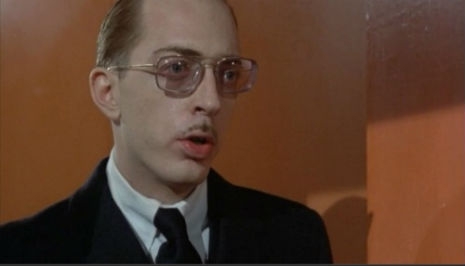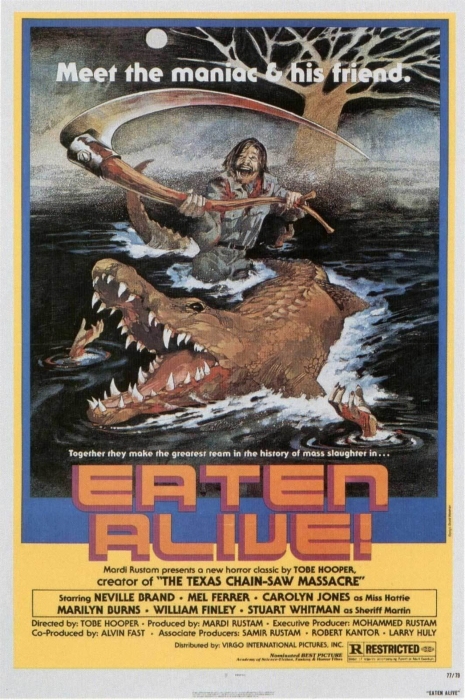
Dangerous Minds was saddened to learn that director Tobe Hooper died on Saturday. Hooper is best known for The Texas Chain Saw Massacre, his 1974 low-budget horror masterpiece concerning a group of young people terrorized by a family of cannibalistic nutjobs. The movie was an artistic, critical and financial success, grossing more than $30 million in the U.S. Hopper’s anticipated follow-up was initially given a limited release in 1976.
Eaten Alive is a horror/exploitation film about a deranged hotel owner who kills his guests and feeds them to his pet crocodile. It has solid B-movie cast, including Marilyn Burns, who memorably screamed her head off in Chain Saw, and a heavily made-up Carolyn Jones, who was “Morticia” on the The Addams Family, playing brothel owner Miss Hattie. A young Robert Englund (a/k/a “Freddy Kruger”) is great as the lowlife “Buck.” Englund utters the unforgettable first words in the picture: “Name’s Buck. I’m rarin’ to fuck.’” The dialogue was later adapted by Quentin Tarantino and used in Kill Bill: Volume One.
Eaten Alive was given a wide release in the states in 1977, and in 1978, a slightly edited cut was approved by the BBFC, the British ratings board. Released in the UK as Death Trap, it gained notoriety a few years later, after it appeared on home video.
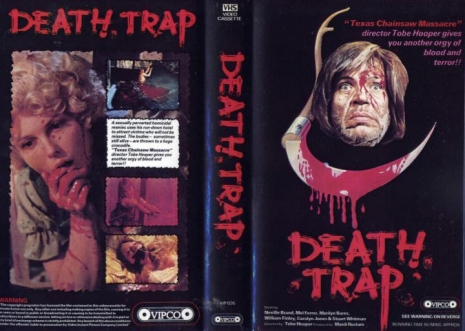
In Britain during the early 1980s, there was a moral panic regarding the availability of certain movies on VHS. At first, motion pictures that came out on video didn’t have to be rated, meaning anyone of any age could rent them. Especially violent and gory pictures like Driller Killer and I Spit on Your Grave were singled out as being inappropriate for young people; the films identified as such came to be known as “Video Nasties.” In 1982, Death Trap was one of those successfully prosecuted under Britain’s Obscene Publications Act, and the distributor had to surrender all VHS copies to the court. If you’re wondering the fate of The Texas Chain Saw Massacre, well, it was denied certification by the BBFC in 1975 and didn’t come out in Britain until 1999—! The following year, Death Trap was once again made available on home video in the country.
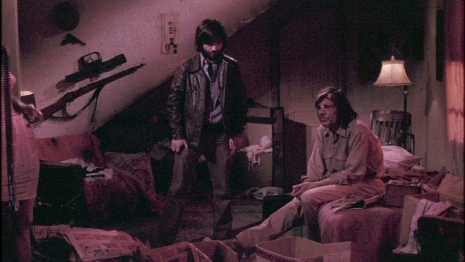
Hooper and actor Neville Brand on set.
After repeated disputes with producers, Hooper quit before filming of Eaten Alive was complete, leaving it to be finished by others. While the final product certainly doesn’t match the quality of Chain Saw, the picture isn’t without its merits. Many scenes are effectively unsettling, especially those involving the terrorized child staying at the hotel, which are particularly unnerving. Hooper’s use of color is notable, and the atmospheric outside shots look really cool.
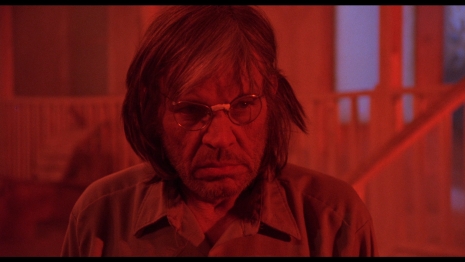
I tend to agree with this IMDb user’s assessment of the film and of Neville Brand, who plays the hotel owner:
‘Death Trap’ reminds me of Dario Argento’s movies. Not in the subject matter, or directorial style, but in the sense that what you’re seeing is a filmed nightmare, devoid of logic, but full of memorable over the top images. The sets are cheap and nasty, the acting varies from quite good to plain silly, the “plot” can basically be summed up as: people check into a seedy motel and get fed to a pet crocodile by its nutty owner, but you know what? It’s still a hell of an entertaining trashy horror movie.
Neville Brand (‘The Ninth Configuration’) gives a gonzo, almost vintage Timothy Carey-like performance as psycho scythe wielding “Judd,” owner of the one place in town you really don’t want to check in to.
More after the jump…






